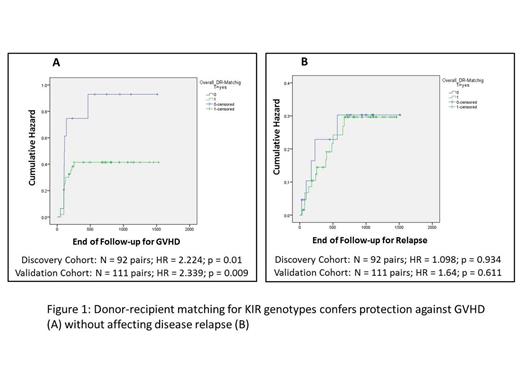Allogeneic hematopoietic cell transplantation (allo-HCT) is a curative therapy for malignant and non-malignant hematological disorders. Unfortunately, complications of HCT, primarily graft versus host disease (GVHD) and relapse of the underlying disease are substantial. In Alberta, all HCTs are performed with antithymocyte globulin conditioning and >95% of these use HLA matched donors. However, in spite of that approximately 35% Albertan HCT recipients die or suffer long-term from GVHD while another 20% die due to disease relapse. Unfortunately, strategies/treatments aiming to control GVHD in most cases lead to increase in the rate of disease relapse and infections. In the recent years, the natural killer (NK) cell genetic system has garnered substantial research interest as an immunogenetic system that significantly influences HCT outcomes. The complexity of NK cell function is modulated by a series of activating and inhibitory cell surface receptors known as the Killer Immunoglobulin-like Receptors (KIR). Here we set out to determine the influence of KIR matching between HCT donor and recipient pairs on allogenic HCT complications.
Hypothesizing that donor-recipient KIR gene/profile mismatch would affect the allo-HCT outcomes, we genotyped 92 (discovery cohort) and 111 (validation cohort) allo-HCT pairs by Luminex-based rSSO method. The KIR genotypes were classified into AA and Bx genotypes on the basis of KIR gene constitution of the individual. Donor (D) and recipients (R) were ‘matched' for KIR genotypes when both carried either AA (two copies of group A haplotypes) or B/x (at least one copy of group B haplotype) genotypes. Effect of KIR matching on significant GVHD (described as grade 2-4 acute GVHD or chronic GVHD needing systemic therapy) as well as disease relapse was analyzed using binomial regression and Kaplan-Meier statistics.
As observed in both the discovery and validation cohorts, a significant protection against GVHD was conferred upon when both the donor and recipient were matched for the KIR genotypes (HR=2.224; p=0.01) without any effect on disease relapse (HR=1.098; p=0.934) (figure1).
In spite of D-R matching for major immunogenetic determinants like HLA, complications of allogeneic HCT are significant. Since GVHD represents a flip side to graft-vs-leukemia (GVL) reaction, strategies to decrease GVHD in most cases have resulted in increased relapse. Matching donor and recipients for KIR genotypes can offer a significant protection against GVHD without increasing the risk of disease relapse.
No relevant conflicts of interest to declare.


This feature is available to Subscribers Only
Sign In or Create an Account Close Modal